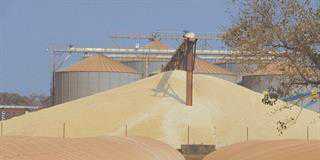
How did SA’s record maize crop last year affect macro-economic indicators such as inflation, export earnings, interest rates and farming income?
The record crop has had a positive impact on the economy as a whole but this has not been appreciated by government. The economy benefited from export earnings – thanks to clever marketing by the private sector. Whether the grain farmers got their fair share is questionable because of the bearish world markets; our grain might have been exported too cheaply.
However, the bottom line is that excellent export performance provided price protection locally within very competitive international markets.
READ:KZN commercial farmers establish transformation organisation
South Africa is also favourably positioned in terms of import demands from leading importing countries such as China. The negative trade balance regarding processed food remains a challenge. We should have been in a better position by now with the processing of locally produced agricultural products – in other words, maize with downstream multiplier effects. The industry may rightfully argue that industrial policy falls short in accelerating local processing.
Let’s take the biofuel initiatives that have been hanging in the balance for years as an example. This industry is on the brink of a near economic abortion. One can therefore debate whether the record crop was exploited to the full or whether it was another successful rescue buoy provided by willing and able grain farmers.
How does the SA consumer’s high level of indebtedness and unemployment affect food consumption and farming income?
This is a major concern, bearing in mind that the poorest 30% of our population spend almost 50% of their discretionary income on food and that an increasing number of households suffer from household food insecurity. Record maize crops do not reach the poor, allowing them to eat more. Lower staple prices simply mean that money is available to fill other gaps. Not enough people benefit from lower farm-gate prices because of the extremely high transaction costs.
This widens the gap between farm-gate prices and what the consumer can afford to buy. Remember that farmers are price-takers; all the costs they incur have a negative impact on their bottom line and cannot be passed on. Off-takers at the farm gate can add a whole array of costs including a profit margin to price. As a result, consumer prices can increase to levels that literally prevent people from eating properly. This can encourage government to instigate what it deems to be relief for the poor, all too often leaving farmers with the short stick.
Profitable farming is the only guarantee for sustained food production, which provides the first pillar of food security: availability. Farmers should consider demanding that the other participants in the value chain contribute more aggressively toward the second pillar of food security: affordability.
Which factors could erode wealth of farmers?
Farmers have a simple calling. They can and will produce food and should be allowed to do so without any hindrance. Policy uncertainty and administrative incompetence prevent them from answering their calling. Despite a possible catastrophic grain harvest this year, government still finds it fit to pander to populist demands and put land reform initiatives in jeopardy.
The initiatives from organised agriculture’s leadership were ignored. It is likely that the opportunity costs will be high and the country will fall victim to increased administrative incompetence and remain rudderless in a sea of policy uncertainty. This contradicts policy flexibility from countries competing for the consumers’ dollar worldwide.
There is a concern that the government does not understand the gravity of the situation and is therefore not moving at the required pace. In trying to find an economic growth catalyst, the government is putting the emphasis in the wrong place. Profitable farmers are the only solution to sustainable rural development. Also, more time and material should be devoted to commercial agriculture because it provides emerging commercial farmers with something to aspire to.
The silence from all levels of government about the pending poor grain harvest is tragic. Government seems to lack the ability to properly support any disaster. It is a mystery why a pending “war room” is not set up to face the coming impact of the drought – no food will be a bigger disaster than no electricity. Fortunately, enough farmers kept up production despite this almost obstructive conduct by government.
You’ve also said that farmers should act aggressively to protect the intrinsic value of their products on the other side of the farm gate. Please explain.
The produce leaving the farm gate is the fuel on which the entire value chain runs. Off-takers should enhance and add value to the value chain in the same spirit. Unnecessary transaction costs impact negatively on both sides of the farm gate. All participants in the value chain, including the government, should collaborate to create an environment which ensures that agricultural produce reaches the consumer in a state that will encourage him or her to spend money on it.
How is South Africa faring in terms of exploring new export grain-market opportunities?
I am impressed by the export initiatives launched by Grain SA and other parties. Grain SA appears to be relentless in seeking sustainable export markets. They are not operators in that space but have an important role to play in gearing up their members to produce what and when world markets demand.
Grain SA is also well- positioned as a neutral entity engaging the various role players. Because it has no direct interest, it is able to ensure fair play and transparency. South Africa has a leading role to play in providing staple foods but suffers from a variety of challenges, many of which stem from neglect by government.
When organisations such as Grain SA and Agri SA work around the clock and towards better understanding of what agriculture can offer and what the industry deserves in South Africa, they run the risk of estranging themselves from their support base if tangible benefits do not follow. These organisations should get more credit for work done in terms of an enabling environment.
However, recent developments such as the announcements pertaining to ownership of land damage the organisations’ image. Their engagement with the government needs recalibration. Agriculture is far too important to allow the government as one of the parties to wilfully change direction and intent. More assertiveness is now needed. Making agriculture work for everybody calls for a team effort. Team members jeopardising the performance need to be disciplined.
Compare this to rugby. The Cheetahs will not tolerate the Bull’s intent to beat them, and vice versa; each team plays to win. However, the Springbok team cannot afford provincial battles and competition to be present when playing as the national team.
The time has come for a zero tolerance attitude from representative agricultural bodies towards the disruptive playing behaviour of the government. A player can be sacked! Had South Africa’s farmers allowed themselves to be discouraged by the attitude of government, this country would have been left without food.
What is the impact of South Africa’s power-supply constraint on the agricultural sector? How much money does the sector stand to lose this year due to power outages?
The impact of power supply constraints from Eskom will be statistically significant and serious. The impact on irrigation, cold chains and processing, for example, is obvious. But it will cost the industry as a whole, and the tragedy is that farmers will bear the brunt of it. Losses at farm level cannot be passed on though the value chain so the impact on profit and ultimate sustainability will be immense. Even if the system is normalised, the consequences will be felt for a long time.
The power supply problem can also negatively affect competitiveness on the export markets. I do not see any attempt by state bodies to soften the impact. It is as if the ability of farmers and the industry as a whole to always come up with a plan has been taken for granted. The silence from the state underpins the dichotomy in South African agriculture.
Phone Dr Kobus Laubscher on 083 276 8003 or email him at [email protected].
This article was originally published in the 13 March 2015 issue of Farmer’s Weekly.













